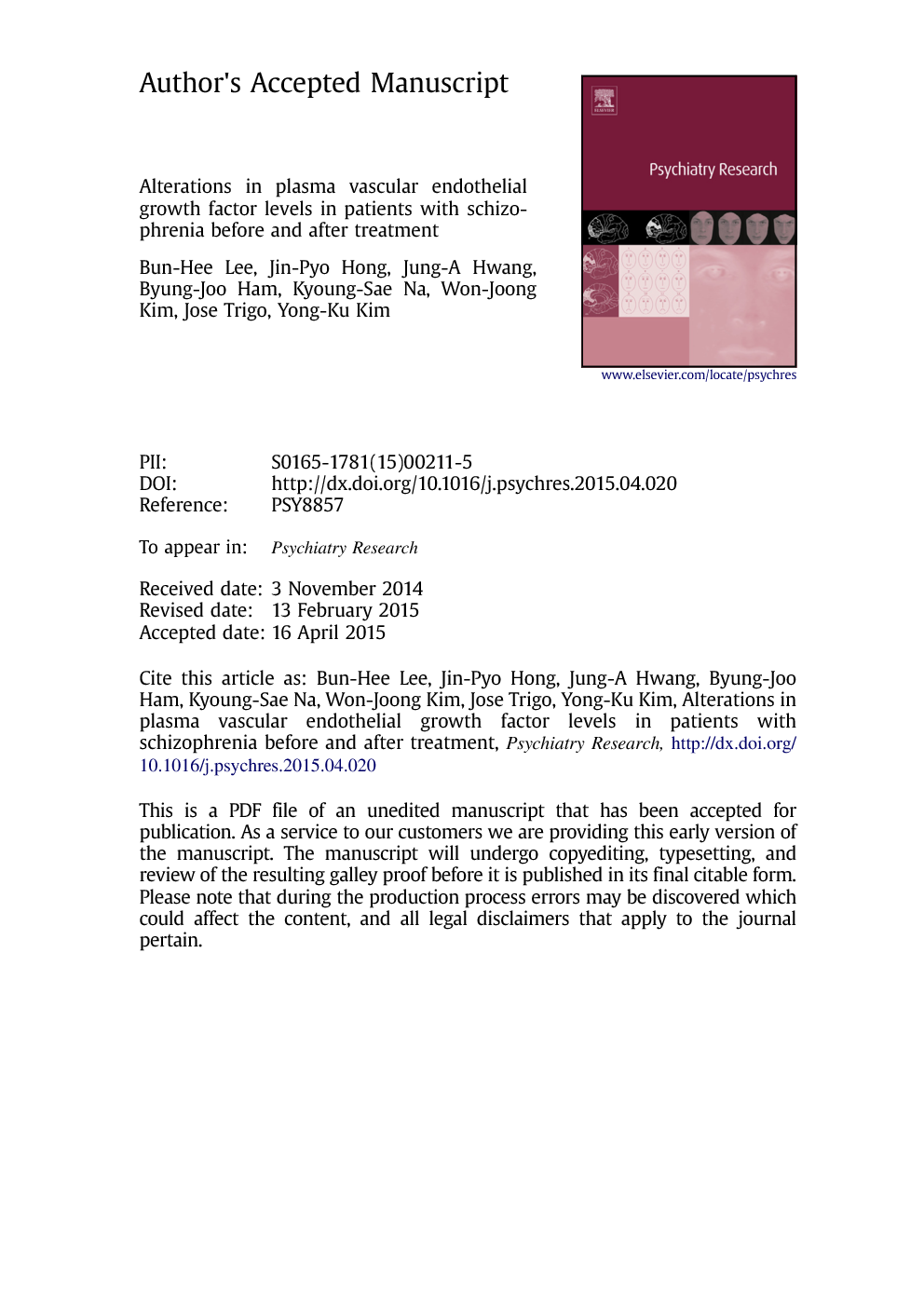Vascular endothelial growth factor (VEGF), a potent angiogenetic factor, is a known neurotrophic factor. In this study, we examined plasma levels of VEGF in 50 patients with schizophrenia (SPR) and 50 healthy control subjects. We also explored any changes in plasma VEGF levels after 6-week treatment with antipsychotic agents in patients with schizophrenia. All subjects with schizophrenia were either medication-naïve or medication-free for at least 4 weeks before assessment. Plasma VEGF levels in all subjects were significantly correlated with smoking duration, which was considered to be a significant covariate. Pre-treatment plasma VEGF levels in patients with schizophrenia were significantly lower than those in healthy controls. Post-treatment VEGF levels were significantly increased in patients with schizophrenia. Plasma VEGF levels in patients with schizophrenia did not exhibit significant correlation with the total or subscale scores of the Positive and Negative Syndrome Scale (PANSS) either at baseline or at the end of the 6-week treatment. In conclusion, our findings reveal that plasma VEGF levels before treatment were lower in patients with schizophrenia and that their VEGF levels increased after treatment. Thus, VEGF may have a neuroprotective role in the improvement of schizophrenia or in the treatment effects of antipsychotics.
Vascular endothelial growth factor (VEGF) is a potent angiogenetic factor that can induce vascular endothelial cell proliferation, migration, and vasopermeability in various kinds of tissues (Ferrara et al., 2003). Moreover, VEGF has been reported to be a neurotrophic factor, and is produced by various cells, including endothelial and mononuclear cells (Dvorak, 2002), and the major receptors of VEGF are expressed not only by endothelial cells, but also by astrocytes, mature neurons, and neuronal progenitors in the adult brain, including the hippocampus (deVries et al., 1992, Krum and Rosenstein, 1998 and Yang et al., 2003). VEGF plays important roles in neuronal survival, neuroprotection, regeneration, growth, differentiation, and axonal outgrowth (Sun et al., 2003). Animal studies demonstrate that adult neurogenesis occurs within an angiogenic niche in the hippocampus and in that region, VEGF stimulates the proliferation of neuronal progenitors in vitro and in vivo (Palmer et al., 2000 and Jin et al., 2002). VEGF has also been observed to promote neurite outgrowth (Khaibullina et al., 2004). Accordingly, VEGF seems to be a critical factor in adult neurogenesis in the hippocampus. A recent imaging study with voxel-based morphometry reported that first-episode patients with schizophrenia have reduced volume in the bilateral hippocampus, parahippocampus, and superior and middle temporal gyri of the brain (Hu et al., 2013). In line with these findings, a postmortem study showed that the proliferation of neural stem cells was diminished in the hippocampus of patients with schizophrenia (Reif et al., 2006). Another study reported decreased VEGF expression in the brain among patients with schizophrenia (Fulzele and Pillai, 2009). However, a recent clinical study found no significant difference in serum VEGF levels between patients with first-episode psychosis and healthy controls (DiNicola et al., 2013). A possible explanation for these divergent results is that patients with first-episode psychosis in the study by Di Nicola et al. (2013) were not specifically diagnosed with schizophrenia. Indeed, clinical data are not yet available regarding VEGF levels in patients with schizophrenia.
We hypothesized that VEGF might be associated with the development of or improvement in schizophrenia as a neurotrophic factor. The aim of this study was to determine whether or not there was a difference in plasma VEGF levels between patients with schizophrenia and healthy controls. We also explored alterations in plasma VEGF levels in patients with schizophrenia before and after treatment with antipsychotic agents. Additionally, we assessed whether plasma VEGF levels correlated with smoking status and duration and considered such variables to be covariants because some studies have suggested that smoking, a known contributing factor of endothelial damage, may affect plasma or serum VEGF levels (Schmidt-Lucke et al., 2005).
We found that baseline plasma VEGF levels were lower in medication-naïve or medication-free schizophrenia patients compared to healthy controls and that VEGF levels were elevated in patients after treatment with antipsychotics. Although the mechanism of VEGF in the pathophysiology of schizophrenia has not yet been explained, it may be that VEGF has a neuroprotective role in the improvement of schizophrenia or in the treatment effects of antipsychotics.


